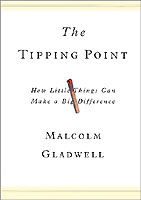
|
 |
The Tipping Point: How Little Things Can Make a Big Difference Malcolm Gladwell 
Format: Paperback, 303pp. ISBN: 9780316346627 Publisher: Little, Brown & Company Pub. Date: January 7, 2002 Hardcover Edition Average Customer Review: For Bulk Orders Call: 626-441-2024 Description and Reviews From The Publisher: With a New Afterword by the Author. New Yorker writer Malcolm Gladwell looks at why major changes in our society so often happen suddenly and unexpectedly. Ideas, behavior, messages, and products, he argues, often spread like outbreaks of infectious disease. Just as a single sick person can start an epidemic of the flu, so too can a few fare-beaters and graffiti artists fuel a subway crime wave, or a satisfied customer fill the empty tables of a new restaurant. These are social epidemics, and the moment when they take off, when they reach their critical mass, is the Tipping Point. Gladwell introduces us to the particular personality types who are natural pollinators of new ideas and trends, the people who create the phenomenon of word of mouth. He analyzes fashion trends, smoking, children's television, direct mail, and the early days of the American Revolution for clues about making ideas infectious, and visits a religious commune, a successful high-tech company, and one of the world's greatest salesmen to show how to start and sustain social epidemics. Reviews Malcolm Gladwell proposes a fascinating and possibly useful theory in The Tipping Point...what makes his book so appealing is the way he approaches his subject...he follows his precept of his subtitle and explores the little things that make a big difference... —New York Times ...a fascinating book that makes you see the world in a different way. — Fortune Magazine Gladwell has a knack for rendering complex theories in clear, elegant prose, and he makes a charismatic tour guide. — Hawthorne, The San Francisco Chronicle Book Review The Tipping Point, by Malcolm Gladwell, is a lively, timely and engaging study of fads... Gladwell, who made his career in journalism as a science writer, has a knack for explaining psychological experiments clearly; The Tipping Point is worth reading just for what it tells us about how we try to make sense out of the world. — Alan Wolfe - The New York Times Book Review From Library Journal This genial book by New Yorker contributor Gladwell considers the elements needed to make a particular idea take hold. The "tipping point" (not a new phrase) occurs when something that began small (e.g., a few funky kids in New York's East Village wearing Hush Puppies) turns into something very large indeed (millions of Hush Puppies are sold). It depends on three rules: the Law of the Few, the Stickiness Factor, and the Power of Context. Episodes subjected to this paradigm here include Paul Revere's ride, the creation of the children's TV program Sesame Street, and the influence of subway shooter Bernie Goetz. The book has something of a pieced-together feel (reflecting, perhaps, the author's experience writing shorter pieces) and is definitely not the stuff of deep sociological thought. It is, however, an entertaining read that promises to be well publicized. Recommended for public libraries.—Ellen Gilbert, Rutgers Univ. Lib., New Brunswick, NJ Copyright 2000 Cahners Business Information. About the Author Malcolm Gladwell is a staff writer for The New Yorker and a bestselling author of narrative nonfiction that examines the intersection of science and culture. In 2005, Time Magazine named him one of the 100 Most Influential People. Table of Contents
Find Items On Similar Subjects |
|

The Essential Lists BOOKS TO READ BEFORE YOU LEAD 
Grow Your Leadership Skills NEW AND UPCOMING LEADERSHIP BOOKS 
Classic Leadership Books BOOKS TO READ BEFORE YOU LEAD |
 |
| ||
 | © 2020 LeadershipNow™ All materials contained in https://www.LeadershipNow.com are protected by copyright and trademark laws and may not be used for any purpose whatsoever other than private, non-commercial viewing purposes. Derivative works and other unauthorized copying or use of stills, video footage, text or graphics is expressly prohibited. |
||